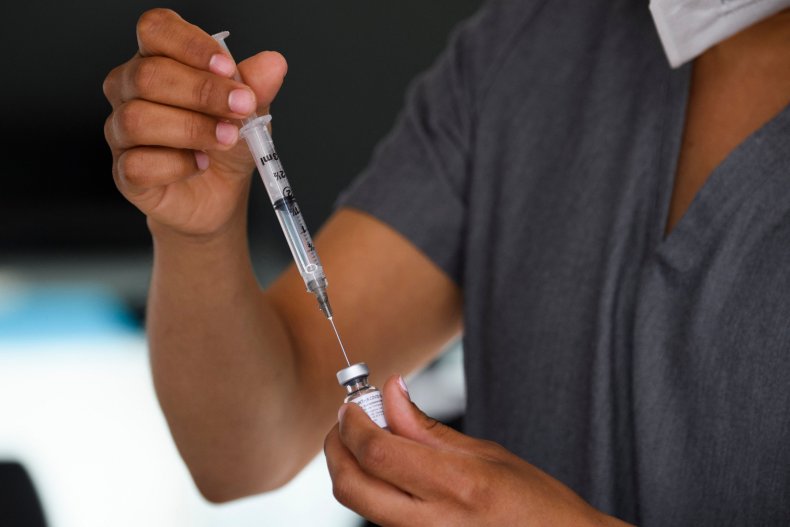Helping South Korea Battle COVID-19 Gives Biden a Chance to Project America's Soft Power | Opinion
President Joe Biden expects 70 percent of American adults to be vaccinated against COVID-19 by the Fourth of July. That is great news but the catastrophe in India reminds us that this is no time for laurels. The U.S. must stay vigilant in its domestic vaccination efforts and use surplus vaccine supplies to defeat this stubborn scourge across the globe.
The combination of Operation Warp Speed's stunning success and many Americans' aversion to inoculation is leading to vaccine supply exceeding demand—perhaps 300 million surplus doses by July. Even as the U.S. looks to expand vaccinations to children and beyond, the prospect of surplus supplies provides President Biden with an exceptional opportunity to exercise America's cleared-eyed practicality on the world stage while advancing its global humanitarian efforts.
Consider South Korea's actions at the outbreak of the pandemic. The country rushed to provide masks and testing kits to the U.S. in response to our inadequate supplies. Subsequently, South Korea's orders for tens of millions of doses of Pfizer, Moderna and other vaccines, beginning in late 2020 bolstered the success of Operation Warp Speed. While the Biden administration is rightly prioritizing the domestic inoculation campaign, the U.S. is positioned to begin releasing projected vaccine surpluses incrementally by July. Allocating doses to fulfill South Korea's existing orders deserves special consideration.
With its state-of-the-art health care infrastructure, South Korea would jump quickly from its current single digit vaccination rates to among the highest in the world. Even with Pfizer and Moderna vaccines' requirement for super-cold storage and shipping, and the two-shot regimen, South Korea would be well on its way to vaccinating its 52 million people, making it an anchor in regional and international efforts against COVID-19.
By itself, this would be a milestone, but the indirect benefits are manifold. In terms of geopolitical realities, the 70-year-old alliance between South Korea and the United States was forged in blood and attests to our shared economic and security interests. With Kim Jong-un's bellicose and erratic regime just over the 38th parallel and Chinese hegemony on the rise, South Korea's public health and security are more important than ever.

Equally important, enabling South Korea's vaccination efforts would allow it to turn its attention outward and assist many other governments around the world which are still underequipped and ill prepared to effectively manage COVID-19 within their borders. South Korea is as well-positioned to provide global leadership given its diplomatic influence and success in containing the pandemic. The world needs countries like South Korea, which has managed the pandemic effectively, to provide public policy guidance to less prepared countries.
The U.S. is now playing a pivotal role in coordinating global efforts against the pandemic. With broad, bipartisan approval, the American Rescue Act is providing billions of dollars to U.S. government agencies and non-governmental organizations working to contain the pandemic in countries around the world. Active U.S. engagement in multilateral efforts to facilitate vaccine production and delivery worldwide will save lives. It also will enable the U.S. to set high standards for accountability, transparency in international rules and standards on vaccination. According to a report from the Center for Strategic and International Studies, this would help build trust in public health efforts and help prevent fraud, price gouging and the distribution of unsafe vaccines in the short term, and strengthen institutional capacity worldwide to avert or contain inevitable future public health crises.
In effect, supporting South Korea would demonstrate President Biden's declaration that "America is back." It would stand in sharp contrast to Russia's touting of its Sputnik V vaccine before testing confirmed its safety and China's raw attempts to use the pandemic to increase its economic and political leverage over other countries.
The coronavirus respects no borders. There is one war with many fronts and only a distant hope for a cease fire. Whether countries are large or small, poor or rich, they have a common enemy that requires a unified, coordinated campaign with enlightened and engaged U.S. leadership.
Joe Biden is especially well-suited to this task. Few can doubt the sincerity of his appeals or dismiss the earnestness of his determination to use the power of his office to extend American know-how and good will. He will have a chance to demonstrate the depth of these convictions by finding a way to deliver South Korea's vaccine orders when President Moon Jae-in visits Washington later this month. Such a gesture would signal that as America looks forward to celebrating its independence on July 4, it will not step back from its commitment to liberating other countries from the grip of COVID-19.
Richard Carmona, MD, MPH, FACS, was the 17th Surgeon General of the United States.
The views expressed in this article are the writer's own.


